Mark Anthony Neal's Blog, page 522
April 18, 2017
Poet Mariahadessa Ekere Tallie: "RainDrop Women"
Published on April 18, 2017 16:23
Joey Badass Talks Trump's America and Making Smart Music
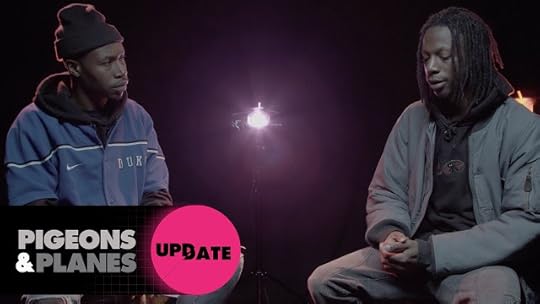 'Just before the release of his new album ALL-AMERIKKKAN BADA$$, Joey Bada$$ sat down with Jinx for an in-depth conversation. Joey talks being an artist in Trump's America, making challenging music, acting in Mr. Robot, and the important advice that Q-Tip gave him.' --
Pigeons & Planes
'Just before the release of his new album ALL-AMERIKKKAN BADA$$, Joey Bada$$ sat down with Jinx for an in-depth conversation. Joey talks being an artist in Trump's America, making challenging music, acting in Mr. Robot, and the important advice that Q-Tip gave him.' --
Pigeons & Planes
Published on April 18, 2017 16:13
AGAINST ALL ODDS: The Fight for a Black Middle Class
 'In AGAINST ALL ODDS: The Fight for a Black Middle Class, acclaimed journalist Bob Herbert explores the often heroic efforts of Black families to pursue the American dream in the face of unrelenting barriers.' -- PBS
'In AGAINST ALL ODDS: The Fight for a Black Middle Class, acclaimed journalist Bob Herbert explores the often heroic efforts of Black families to pursue the American dream in the face of unrelenting barriers.' -- PBS
Published on April 18, 2017 16:08
April 17, 2017
Film Short -- Kamasi Washington's 'Truth'
 A short film directed by AG Rojas -- excerpted from the installation Harmony of Difference by Kamasi Washington and Rojas currently on view at the
Whitney Biennial 2017
.
A short film directed by AG Rojas -- excerpted from the installation Harmony of Difference by Kamasi Washington and Rojas currently on view at the
Whitney Biennial 2017
.
Published on April 17, 2017 06:14
April 15, 2017
Christina Greer on Civic Engagement and the Presidency
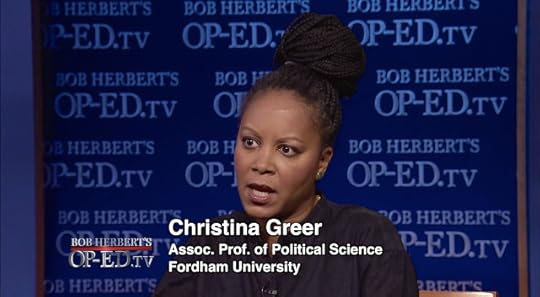 'What lessons have we learned from these early months of Donald Trump’s presidency? Will we continue to view presidential elections primarily as entertainment, an around-the-clock reality show? Or, are the protests and organizing efforts signs that we are taking politics more seriously, that we’re more willing to become civically engaged? Is there a danger that younger people might think this kind of haphazard, chaotic and often ill-informed presidency is normal? Bob Herbert host of OP-ED.tv talks about all of this with guest Christina Greer, an Associate Professor of Political Science at Fordham University, and author of the book,
Black Ethnics: Race, Immigration and the Pursuit of the American Dream
.' --
CUNY-TV
'What lessons have we learned from these early months of Donald Trump’s presidency? Will we continue to view presidential elections primarily as entertainment, an around-the-clock reality show? Or, are the protests and organizing efforts signs that we are taking politics more seriously, that we’re more willing to become civically engaged? Is there a danger that younger people might think this kind of haphazard, chaotic and often ill-informed presidency is normal? Bob Herbert host of OP-ED.tv talks about all of this with guest Christina Greer, an Associate Professor of Political Science at Fordham University, and author of the book,
Black Ethnics: Race, Immigration and the Pursuit of the American Dream
.' --
CUNY-TV
Published on April 15, 2017 16:51
B-Side: The Last Poets with Abiodun Oyewole + Umar Bin Hassan + Baba Donn Babatunde
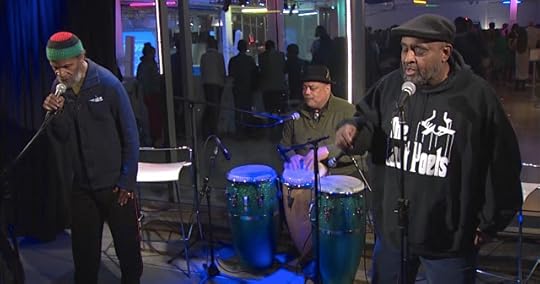 'The Last Poets started as a group of young Harlem activists creating art in the wake of the assassinations of Malcolm X, and Martin Luther King, Jr. in 1968. Stripped of prominent leaders, and voices to advocate on their behalf, the collective used their own. Combining sharp verses with Afro-roots percussion, they quickly went from performing on street corners to releasing highly coveted albums nationwide. Credited as the first group to transform poetry into rap, their influence can be traced to just about every hip-hop group performing today. B-Side is delighted to welcome Abiodun Oyewole, Umar Bin Hassan, and percussionist Baba Donn Babatunde into the studio for a night of poetry, rhythms, and conversation.' --
BRIC TV
'The Last Poets started as a group of young Harlem activists creating art in the wake of the assassinations of Malcolm X, and Martin Luther King, Jr. in 1968. Stripped of prominent leaders, and voices to advocate on their behalf, the collective used their own. Combining sharp verses with Afro-roots percussion, they quickly went from performing on street corners to releasing highly coveted albums nationwide. Credited as the first group to transform poetry into rap, their influence can be traced to just about every hip-hop group performing today. B-Side is delighted to welcome Abiodun Oyewole, Umar Bin Hassan, and percussionist Baba Donn Babatunde into the studio for a night of poetry, rhythms, and conversation.' --
BRIC TV
Published on April 15, 2017 16:41
Think Culture is Expensive? Consider the Cost of Ignorance
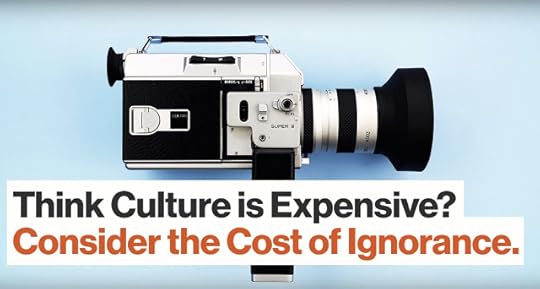 'The arts reflect what a country is, says Jane Rosenthal — so what kind of country is the US if it cuts funding to its arts communities? The NEA and PBS are two organizations on the chopping block under the Trump administration's proposed budget. Rosenthal — a film producer and co-founder of the Tribeca Film Festival — reminds us of how crucial story telling is for individuals and nations.' --
Big Think
'The arts reflect what a country is, says Jane Rosenthal — so what kind of country is the US if it cuts funding to its arts communities? The NEA and PBS are two organizations on the chopping block under the Trump administration's proposed budget. Rosenthal — a film producer and co-founder of the Tribeca Film Festival — reminds us of how crucial story telling is for individuals and nations.' --
Big Think
Published on April 15, 2017 16:31
If Your Pastor Says 'Racism Isn't A Skin Problem, It's A Sin Problem,' You Need To Find Another Church
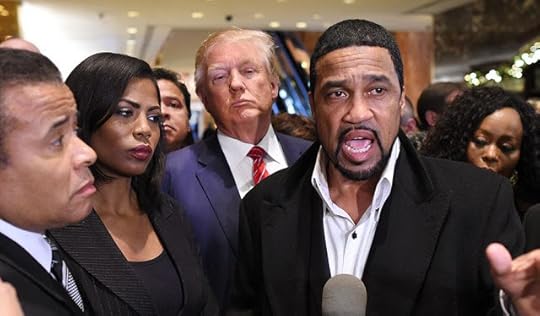 If Your Pastor Says 'Racism Isn't A Skin Problem, It's A Sin Problem,' You Need To Find Another Churchby Lawrence Ware | @Law_Writes | NewBlackMan (in Exile)
If Your Pastor Says 'Racism Isn't A Skin Problem, It's A Sin Problem,' You Need To Find Another Churchby Lawrence Ware | @Law_Writes | NewBlackMan (in Exile)Recently, I decided to visit a popular, contemporary church known for its multicultural emphasis. (Read: it tries to be neither a “Black church” nor a “White church” in its cultural expressions of Christian worship.) I did this because, after being conspicuously silent about race and racism after the Charleston shootings (the church did not so much as post on their social media sites that they were praying for the victims. Instead, they posted videos about their upcoming sermon series), the Black pastor of this multicultural church decided to tackle the issue of race in a sermon series.
After a praise and worship session that took great care to be neither overly Black in the singing style nor song selection, he began the sermon by saying something I’ve heard many times before—something I hoped I would never hear come out the mouth of a person whose lived experience of race in America provides a lens through which to read the Bible critically. He said, “Racism isn’t a skin problem, it’s a sin problem.”
By this, he meant that it could be remedied by interpersonal interactions with people of different ethnicities. He went on to provide possible solutions to racism. He suggested that people of different races should have dinner together and engage in conversation about their lived experience. White folks in the crowd clapped their hands approvingly. Black folks in the audience shook their head as if they had just heard words from on high.
Some folks go to church to get prayer. Yet, as a philosopher of race and ordained minister dedicated to social justice, I left church needing someone to pray me back into a peaceful place. There is value in people from different backgrounds engaging in dialogue, but talking is not enough. Put succinctly, the pastor pissed me off.
I am not advocating for racially segregating worship. But a person who has lived on the underside of the American democratic experience because of their race is likely to understand the Bible differently from those who have reaped its benefits.
In the same way that both the slave and the slave owner prayed to a divine being but their understanding of God differed radically from one another, Black churches and White churches have historically had very different understandings of what it means to be a Christian. Black churches have historically been on the cutting edge of social justice movements as it relates to race and economic inequality. (Many of them, however, are either woefully silent or sinfully oppressive on issues like patriarchy and homophobia.)
It is this Black interpretive lens that explains why people like Nat Turner, Bishop Henry McNeal Turner, Richard Allen, and Dr. Martin Luther King, Jr. felt so strongly about social injustice. Their understanding of God was of one who is not interested in merely having people of different ethnicities be nice to one another—Black Christians see God as a person who is interested in liberation.
Asking those who have access to Whiteness and the privilege it brings to merely tolerate Black people is not liberation. To liberate those who are marginalized because of racism is to commit to a fundamental change to the structure of this country. Those who are racially profiled and sentenced under minimum mandatories because of the war on drugs are in need of liberation. Black and brown folks who are disproportionately in poverty relative to White folks are in need of liberation. Black children who disproportionately attend decrepit and underfunded schools are in need of liberation. Black women raised in a culture that places a premium on Eurocentric beauty standards are in need of liberation.
Even older Black men who constantly wear wind-suits with dress shoes and leather baseball hats are in need of liberation. And saying racism is a sin problem that we can solve by being kinder to each other serves the purposes of White supremacy because it does not force White folks to come to terms with the way they may contribute to institutional racism in the decisions they make at work and the way they vote at the polls.
If you attend a Christian church that has little to say in support of the movement for Black lives, if your pastor has called for prayer in regard to unity in the wake of police shooting of unarmed black men, women and children but has not pushed the congregation to engage in social protests to address the systemic nature of racial injustice, then White supremacy, not Jesus, may be your god. If racism is, indeed, a sin problem and not a skin problem, then someone needs to repent. And by someone, I mean America.
A version of this was published at Very Smart Brothas.
+++
Lawrence Ware is a philosopher of race at his day job and writes if the kids go to bed on time. He is a contributing editor of NewBlackMan (in Exile) and a frequent contributor to The Root and VSB. He has been featured in the New York Times and you can sometimes find him discussing race and politics on HuffPost Live and Public Radio International. He is the kind of Steelers fan that enjoys watching the Cowboys lose.
Published on April 15, 2017 16:18
April 14, 2017
Beyond Choice: Organizing for Reproductive Justice
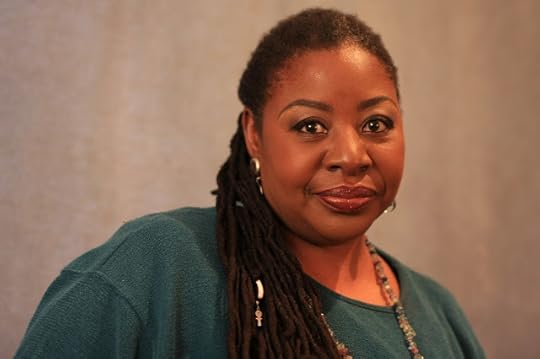 'At the end of March 2017, Congress passed a bill allowing states to deny funding to family planning groups that offer abortion services - groups like Planned Parenthood. Now, Pennsylvania and Michigan have introduced legislation to join over a dozen states in doing just that. On this week's Making Contact, Loretta Ross, co-founder of
SisterSong
breaks down the reproductive justice framework; and Tina Reynolds, co-founder and Chair of Women on the Rise Telling HerStory, shares how a group of formerly incarcerated women came together to fight for the right to give birth to and raise children in healthy and safe environments.' --
Making Contact
'At the end of March 2017, Congress passed a bill allowing states to deny funding to family planning groups that offer abortion services - groups like Planned Parenthood. Now, Pennsylvania and Michigan have introduced legislation to join over a dozen states in doing just that. On this week's Making Contact, Loretta Ross, co-founder of
SisterSong
breaks down the reproductive justice framework; and Tina Reynolds, co-founder and Chair of Women on the Rise Telling HerStory, shares how a group of formerly incarcerated women came together to fight for the right to give birth to and raise children in healthy and safe environments.' --
Making Contact
Published on April 14, 2017 18:48
Symposium on Race and Transgender Studies with Marcia Ochoa + Kai M. Green + C. Riley Snorton
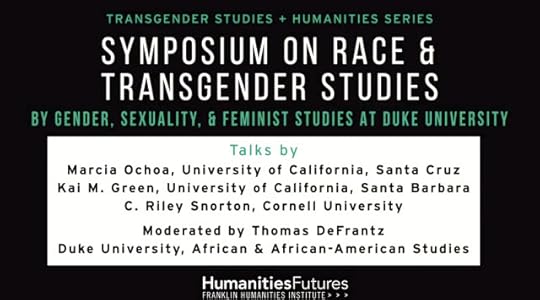 "Transgender Studies + Humanities Series -- Symposium on Race and Transgender Studies with Marcia Ochoa (UC-Santa Cruz). Kai M. Green (UC Santa Barbara), C. Riley Snorton (Cornell U.), and moderated by Thomas DeFrantz (Duke, AAAS Department).' --
Duke Franklin Humanities Institute
"Transgender Studies + Humanities Series -- Symposium on Race and Transgender Studies with Marcia Ochoa (UC-Santa Cruz). Kai M. Green (UC Santa Barbara), C. Riley Snorton (Cornell U.), and moderated by Thomas DeFrantz (Duke, AAAS Department).' --
Duke Franklin Humanities Institute
Published on April 14, 2017 18:40
Mark Anthony Neal's Blog
- Mark Anthony Neal's profile
- 30 followers
Mark Anthony Neal isn't a Goodreads Author
(yet),
but they
do have a blog,
so here are some recent posts imported from
their feed.




